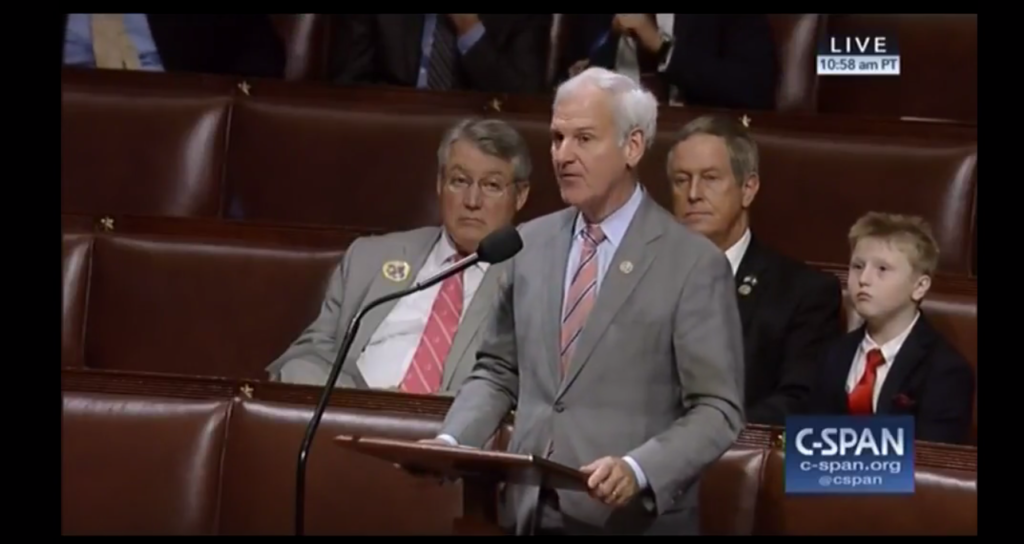Bradley Byrne: Who will build our 355 ship Navy?

America has the most powerful Navy the world has ever seen. For centuries, our sailors have provided peace and stability around the globe. With over eighty percent of the world’s population living within sixty miles of the sea and ninety percent of world trade moving by sea, a strong and capable U.S. Navy is critical to a bountiful economy and the wellbeing of humanity. Unfortunately, due to defense cuts and a shrinking fleet size, competitors are challenging our naval superiority. This is why it is critically important we support the Navy’s proposed 355 ship fleet and continue to invest in the latest technology. In order to grow our Navy and make sure we continue to be an example of strength for the rest of the world, it is vital that we have a robust shipbuilding industry here at home. Shipbuilding and ship repair have been an important part of our national economy since our country’s founding. Nationally, the industry accounts for roughly 400,000 jobs, provides $25.1 billion in labor income, and contributes over $37.3 billion to the GDP. Shipbuilding is about both national security and a strong economy. Unfortunately, we cannot build up to the 355 ship fleet of tomorrow without a skilled and capable workforce. Our nation continues to experience a severe gap in skilled workers, and the shipbuilding industry is not immune to this problem. This is one example why career and technical education (CTE) programs are so important. They provide American workers with the development and training needed to build the ships that are necessary in order to maintain our naval superiority. Thousands of workers in the United States look to technical education programs as a path forward in their careers. Whether it is a sudden and unexpected career change or a well-planned out career for a high school student, CTE programs offer opportunity and growth for a wide range of Americans. Aaron, one of my constituents in Southwest Alabama, is a great example of a CTE success story. Ten years ago, he started out as a plumber, but after going through a CTE program, he now supervises pipe and machinery for an entire shipyard in coastal Alabama. His supervisor cites him as one of their best leaders. His life was forever changed thanks to CTE, and he is now helping build our nation’s warships. As the former chancellor of the Alabama’s community college system, I have seen these CTE programs firsthand and they work like magic. Encouraging our nation’s workforce to specialize in a valuable trade like shipbuilding and repair improves their lives and also provides tremendous benefits to both our economy and our national security. Earlier this year, the House passed H.R. 2353, the Strengthening Career and Technical Education for the 21st Century Act, on a huge bipartisan vote. Our bipartisan bill updates the Carl D. Perkins Career and Technical Education Act by empowering state and local leaders, improving alignment with in-demand job areas, and increasing transparency and accountability. These reforms will make our CTE programs stronger, which in turn will benefit the overall U.S. economy. The bill is now under consideration in the Senate, and I hope they will act swiftly on this bipartisan bill to help train the workforce of tomorrow, including our nation’s shipbuilders. As President Theodore Roosevelt said in 1902, “A good Navy is not a provocation to war. It is the surest guaranty of peace.” As we work to build up our Navy, let us not lose sight of the importance of maintaining and supporting a skilled workforce to build the 355 ship fleet of tomorrow. • • • Bradley Byrne is a member of U.S. Congress representing Alabama’s 1st Congressional District.
Martha Roby: Connecting today’s students with tomorrow’s careers

The June jobs report was released Friday, and it shows some positive economic progress. Wages are up and the economy added 222,000 jobs, far exceeding expectations for June. The national unemployment rate ticked up by a tenth to 4.4 percent, but economists say that’s actually healthy because it was caused by more Americans joining the workforce. Alabama’s unemployment rate sits at 4.9 percent, which is its lowest level in nine years. All this is welcome news, and our focus going forward must be continuing the positive momentum. The House of Representatives has recently taken several measures to foster economic growth and opportunity, and I am particularly proud of our work to strengthen career and technical education to support our workforce. I’m a big believer in career tech programs for three simple reasons: They help prepare students for rewarding careers; they ensure American workers have the necessary training for skilled trades that are foundational to our society; and they boost local economies by producing a quality workforce. For more than 30 years, federal funding known as Perkins funding has helped support career tech programs at the state and local level. Recently, the House passed H.R. 2353, the Strengthening Career and Technical Education for the 21st Century Act, to reauthorize this funding and make needed improvements to ensure Perkins dollars are spent efficiently and effectively. When it comes to higher education, there has been a silent stigma attached to not completing an academic degree at a four-year university. For too long society refused to acknowledge that college really isn’t for everyone and that a solid career tech education can actually lead many Americans to a better quality of life. Thankfully, I believe those days are over. Efforts like Mike Rowe’s “Go Build America” campaign have been successful in raising awareness and dispelling myths about the jobs that exist in skilled trades. Law enforcement, automotive technology, welding, carpentry, machine technology, transportation and logistics, health science, and information technology are just some of the high-demand career fields students can pursue through a career tech program. Our state is fortunate to have a strong network of community colleges offering a wide variety of career training. Alabama’s Community College System has more than 79,000 students enrolled in career tech programs, and more than 70 Alabama public high schools offer CTE courses. They are working hand-in-glove with industries to make sure the training matches the jobs that will be waiting for students when they complete their courses. Alabama’s 2nd District is home to thriving career tech programs at places like Trenholm State Community College in Montgomery, Wallace Community College in Dothan and their Sparks Campus in Eufaula, Enterprise State Community College campuses in Enterprise and Ozark, Ingram State Technical College in Deatsville, Reid State Technical College in Evergreen, and Lurleen B. Wallace Community College campuses in Andalusia, Opp, and Greenville. Many high schools are now partnering with nearby community colleges to offer students courses closer to home. I’ve had the privilege of visiting many of these campuses and seeing firsthand the quality training being offered. As encouraged as I am about our current system, I see so much more potential for students and local communities through proper investment in quality career tech programs. The Strengthening Career and Technical Education for the 21st Century Act provides that with more than $5.9 billion over the next five years. However, the bill is so much more than just funding. The bill also simplifies the application process for grants, provides greater flexibility to program administrators so they can adjust to changing needs, improves accountability to require that career tech programs deliver results, and ensures a proper limited federal role in education. Career tech programs connect today’s students with tomorrow’s careers by equipping them with the skills, knowledge, and experience they need to be competitive in the workforce. I will continue to do all I can to support these efforts as your Representative in Congress. ••• Martha Roby represents Alabama’s Second Congressional District. She lives in Montgomery, Alabama with her husband Riley and their two children.
Byrne, Roby celebrate House passage of bill to overhaul career-tech education

Americans face a job market vastly different from the one that existed a generation ago. With constant advances in technology and an ever-growing global economy, the kinds of jobs available require high-quality education and skills development vital to competing in today’s workplaces. Since 1984, the Carl D. Perkins Career and Technical Education Act has endeavored to provide federal support to state and local career and technical education, or CTE, programs. But the law has not been updated in more than a decade, and no longer reflects the realities and challenges facing students and workers. Which is why the House of on Thursday approved a bill update the law and help all Americans access the education they need to earn a lifetime of success. H.R. 2353, the Strengthening Career and Technical Education (CTE) for the 21st Century Act, passed on a voice vote, reauthorizes and updates the Carl D. Perkins Career and Technical Education Act and includes some important reforms: Empowers state and local community leaders; Improves alignment with in-demand jobs; Increases transparency and accountability to ensure programs deliver results; Simplifies the application process Provides greater flexibility to program administrators so they can adjust to changing needs; Ensures a limited federal role in education. Alabama 1st District U.S. Rep. Bradley Byrne, Chairman of the House Workforce Protections Subcommittee, today celebrated the passage of the bill saying it will have a “huge impact at creating opportunities for Americans in Southwest Alabama and around the country.” “Improving career and technical education programs is the most important thing Congress can do to help close the skills gap, combat poverty, and put Americans back to work,” said Byrne. “I’ve seen these programs firsthand dating back to my time as Chancellor of Alabama’s two-year college system, and they truly work like magic. “This is the type of bipartisan bill that will never get the attention it deserves, but it will have a huge impact at creating opportunities for Americans in Southwest Alabama and around the country.” His Alabama House colleague, 2nd District U.S. Rep. Martha Roby echoed his sentiments. “I’m a big believer in Career Tech programs for three simple reasons: They help prepare students for rewarding careers; They ensure American workers have the tools necessary for skilled trades that are foundational to our society; And, they boost our economy by providing a quality workforce,” said Roby ahead of the vote. “With the modern workplace changing at a rapid pace, it is imperative that educators and facilities keep up. With this bill, these programs can continue to successfully connect today’s students with the careers of tomorrow.” Byrne delivered a speech on the House floor in support of the bipartisan legislation. Watch below: A transcript of Byrne’s remarks can be found below: I thank the Chairwoman for yielding, and I am proud to rise in support of this strong, bipartisan legislation. Improving career and technical education programs is the most important thing Congress can do to help close the skills gap, combat poverty, and help put Americans back to work. Studies clearly show that there are unfilled, high wage jobs out there that remain open because people lack the skills to fill the jobs. That’s where CTE comes in. When I was Chancellor of Alabama’s two-year college system, I saw firsthand just how impressive these programs are. They really do work like magic by taking an untrained worker and giving them the skills they need to fill an in-demand job. It is a win-win situation for everyone. So, Mr. Speaker, I am proud to be an original co-sponsor and supporter of this legislation, I encourage my colleagues to join me in supporting this reform-oriented bill that helps build the 21st Century workforce. Watch Roby’s floor speech below:
Alabama members call for longer-term transportation planning after trust fund vote
The U.S. House has passed H.R. 2353 — a bill approving temporary funding for the nation’s federal transportation trust fund for two months beyond an impending statutory cutoff — with the support of U.S. Reps. Bradley Byrne and, somewhat more surprisingly, Terri Sewell. But that didn’t stop either from expressing displeasure at the short-term nature of the bill passed Tuesday, a result of ongoing gridlock over myriad issues in the House. Byrne and Sewell, who respectively represent Alabama’s 1st and 7th Congressional Districts, each issued statements Tuesday evening saying a more predictable and comprehensive approach is required for maximum public good. “It is sometimes hard in Washington for Republicans and Democrats to find common ground, but both sides agree we need a long-term, reliable funding stream for the Highway Trust Fund,” Byrne said in his news release. “While I voted for today’s short term extension, I will not continue to support kicking the can down the road and putting off difficult decisions. Funding our nation’s highway system is a fundamental responsibility of Congress, and it is time we get serious about finding a solution. I intend to be a constructive participant in that process.” Sewell — breaking with most of her caucus, which opposed the measure — echoed those statements after her “yea” vote Tuesday afternoon. “The Highway Trust Fund Extension is nothing more than a Band-Aid. It’s disappointing that Congress is no closer to drafting a long-term solution to invest in our nation’s roads, bridges, and rails than we were this time last year,” Sewell said in her written statement. “Our nation’s investment in infrastructure is woefully inadequate to the detriment of our constituents.” “In Alabama, deteriorating roads cost motorists approximately $1.2 billion a year. Across our country, an estimated one in three fatal traffic accidents is caused by roads that are in poor or mediocre condition, and the American Society of Civil Engineers estimates that one out of every nine bridges in the U.S. is structurally deficient.” Sewell ended, however, on a hopeful note. “By building the infrastructure of tomorrow, we would also create thousands of good-paying jobs that help more hard-working Americans earn a living.”


